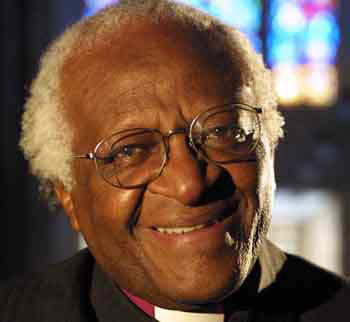TORONTO — Though known for his censorious statements about Israel’s treatment of the Palestinians and his vocal support for the boycott, divestment and sanctions (BDS) movement, human rights activist and retired Archbishop Desmond Tutu met May 27 in Toronto with a delegation from the Centre for Israel and Jewish Affairs (CIJA).
The archbishop was in Canada to attend an international gathering of the Order of St. John, of which St. John Ambulance is a service organization, and met privately with Shimon Fogel, CIJA’s chief executive officer, along with CIJA chair David Koschitzky, board member Berl Nadler, philanthropist Michael Dan and former CEO of Canadian Jewish Congress, Bernie Farber, for about 40 minutes in his suite at the King Edward Hotel.
A Nobel laureate and the first black archbishop of Cape Town, the archbishop rose to renown in the 1980s for his ardent criticism of the South African government’s treatment of blacks and his encouragement of non-violent measures of protest, including boycott and divestment. He has been widely disparaged within the Jewish community for likening Israel to apartheid-era South Africa and for endorsing international boycotts against it.
Fogel stressed that CIJA, part of whose mandate is to build relationships with other faith communities, did not initiate the meeting, but when approached by the Order with a request to meet with Archbishop Tutu, “felt there might be some value in sharing our perspective with him… an opportunity to speak directly and forthrightly about the extent to which [his] statements [about Israel] are misguided, hurtful and offensive.”
He said the meeting focused exclusively on the Arab-Israeli conflict and gave CIJA the chance to express its dismay at Tutu’s articulation of anti-Israel views over the years.
“We characterized his views as deeply hurtful and harmful to the one state in the region in which the Christian community can practise their faith free of the kind of intimidation, threats and persecution that exist elsewhere.”
The archbishop was, according to Fogel, “entirely unrepentant and unapologetic,” showing no willingness to amend his position.
“He was not accepting of the suggestion that [these views] would benefit from additional considerations, for example… that Israel’s legitimate security concerns gave rise to checkpoints, the security barrier and the like.”
Farber stressed that the meeting was, nonetheless, an important opportunity for the Jewish community to convey its beliefs to Archbishop Tutu. He said that “this was done with focus and elegance, with no stone left unturned in terms of trying to make our point.”
He emphasized the archbishop’s views do not in any way represent the opinions of the Order of St. John, which is an apolitical organization supported by Jewish communities worldwide.
While CIJA decided to open a dialogue with Archbishop Tutu, B’nai Brith Canada issued a press release stating that it would not be seeking a meeting with him, given his “hateful statements about the Jewish People” and comparisons of the State of Israel to apartheid South Africa.
B’nai Brith CEO Frank Dimant said his organization was not approached about meeting with Archbishop Tutu, but that “anyone who has the kind of opinions [he] has vis-à-vis the State of Israel is not someone we want to engage in conversation, nor would our grassroots Jewish supporters be in favour of us meeting with him.”
But he made it clear that B’nai Brith is not condemning CIJA’s decision.
Last year, B’nai Brith and UJA Federation of Greater Toronto – with whom CIJA is linked as the advocacy arm of the Jewish Federations of Canada-UIA – signed an agreement pledging to strengthen their ties and work together.
“I clearly state that [CIJA] had every right to meet [Archbishop Tutu],” Dimant said.
“By all means. We’re not saying anything disparaging about their having met with him. We’re just saying that we chose, in representing our constituency, not to meet with him.”
